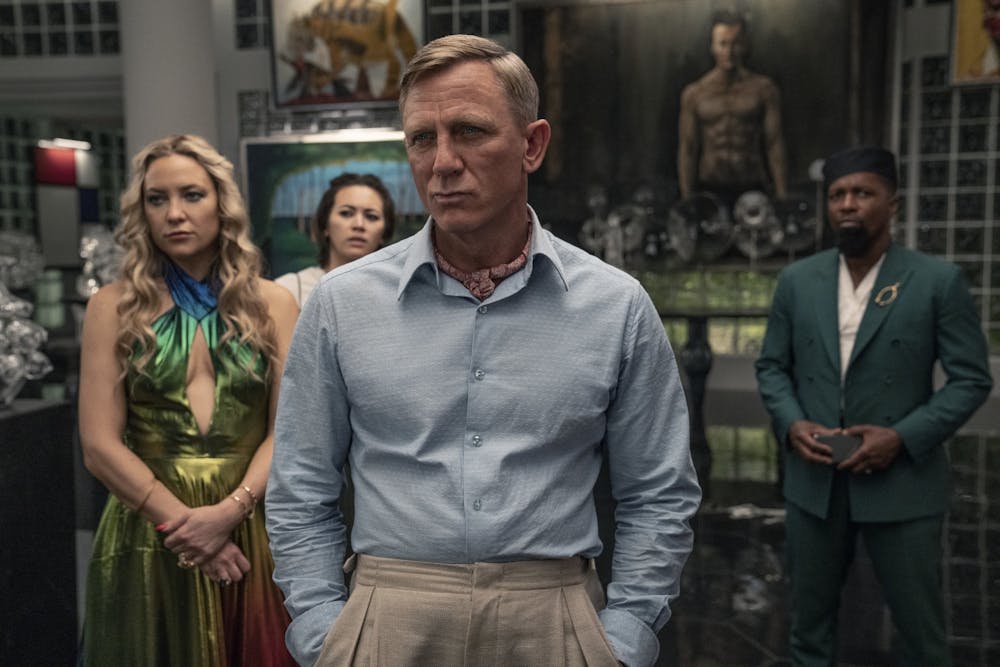Picture this: it’s a crisp autumn day in 2019. You decide to see “Knives Out” in theaters. The cast is stacked, and the premise seems interesting enough. There hasn’t been a classic whodunnit in theaters for ages, so why not? You walk into your local AMC unassuming but leave having seen one of the most refreshing and exciting original stories of the decade. “Cinema!” you shout as you walk back to the car. All is well.
Even though this may not have been your exact "Knives Out” viewing experience, the film’s financial success — it made a whopping $312 million on a $40 million budget — combined with its critical acclaim have cemented it as one of the biggest cinematic successes since the turn of the century.
When the sequel to the 2019 film, “Glass Onion: A Knives Out Mystery,” was announced, I was ecstatic. I couldn’t wait to see another laugh-out-loud, socially relevant mystery on the silver screen. Then I saw that the rights to the franchise had been sold to Netflix for an astounding $450 million. My dream of once again seeing Daniel Craig’s southern detective Benoit Blanc on the big screen had come to an end.
Related: [COLUMN: Spotify Wrapped (IDS Arts Desk Version)]
Yes, “Glass Onion” did receive a limited theatrical release from November 23 to November 29. But for myself and many others, the closest theater to show the film was over 90 minutes away. My drive to and from the theater would be longer than the film’s runtime.
My FOMO has quite possibly never been worse. Seeing people rave about the new film online has only made my anger toward Netflix stronger. Why would they give a film that was destined to be a box office hit such a limited theatrical release? Why would they deprive people of that experience?
To make matters worse, "Glass Onion” won’t be available to stream on Netflix until December 23. Surely, people who saw the film early won’t spoil it for those who couldn’t, right?
Wrong.
Within a few days of its theatrical window closing, I saw multiple spoilers — all small things — but since “Glass Onion” is a whodunnit, I wanted to watch it for the first time knowing as little as possible about the plot. I’ve even avoided watching the trailer.
Maybe you don’t see this as a big deal. I know many people are happy they won’t have to shell out an extra $15 to see “Glass Onion” at the theater. But as Harry Styles once eloquently said, “Glass Onion” feels like a “go to the theater” movie. It has that rare cinematic quality that’s limited to blockbusters and spectacles.
Will I still enjoy the film even though I have to watch it on my TV at home? Most definitely. But the mishandling of “Glass Onion” isn’t a lone occurrence. One of Netflix’s other awards season players, “All Quiet on the Western Front” — Germany’s official entry in the 2023 Academy Awards — also didn’t receive the theatrical release it deserved.
Related: [Sigma Nu to showcase historic Bloomington locations in art gallery Dec. 7]
“All Quiet on the Western Front” is being heralded as one of the best war films of this century. Critics are praising its cinematography, immersive sound design and visceral performances. Yet here I am, watching it on my TV at home as I write this column. This film would’ve been otherworldly in IMAX or Dolby, but I had to settle for my living room couch.
Now that Netflix has begun to produce expensive films like “Glass Onion” and “All Quiet on the Western Front,” it’s time for them to reassess their release strategies, whether that means expanding their films’ theatrical windows or shortening the waiting period between limited theatrical engagements and streaming. They need to stop seeing movie theaters as the enemy and start seeing them as an asset.






